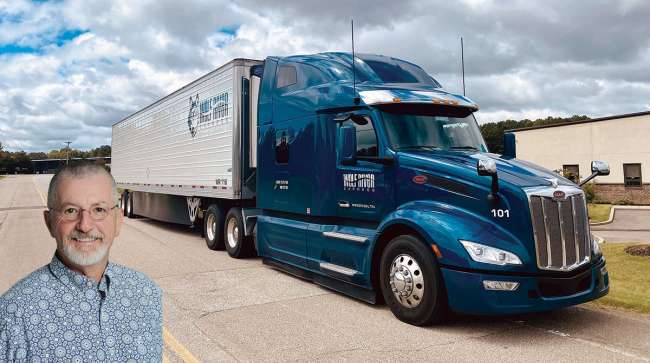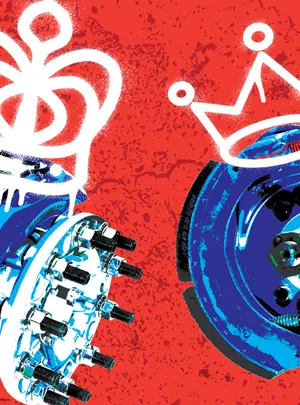5 Questions: Kenneth Eggen, Wolf River Express

[Find the latest in equipment & maintenance: Explore this quarter's issue of Calibrate]
Wolf River Express Chief Operating Officer Kenneth Eggen’s experience within the transportation industry spans more than 35 years with a focus on total asset management. He has been responsible for many thousands of vehicles as it relates to what he terms “cradle to grave” management. In his career, he has overseen many segments of a trucking operation. Since starting with Overnite Transportation in 1987, Eggen has contributed to companies such as J.B. Hunt, Stevens Transport, Roadrunner Freight and Jones Logistics.
His favorite line from his years of experience is: “The floor is where the rubber meets the road.” As he mentioned in the Transport Topics’ RoadSigns podcast (RS 142), Eggen believes in MBWA: management by walking about and meeting people where they are. He has been a member of the Technology & Maintenance Council since 2003. Eggen has served as chairperson of the S.5 and S.2 study groups and as a panelist.
Transport Topics spoke with Eggen about the most concerning issues facing maintenance directors and how these challenges should be addressed for 2025 and in the near term.
How are you planning to manage maintenance costs amid potential economic uncertainties in 2024? Are there cost-saving strategies or innovative approaches being explored?
More Q3 Calibrate

►Are Air Disc Brakes Worth It?
►Freeze: Let's Get Optimistic
►Hexagon Agility and Brudeli Green Mobility to Deliver NZEVs
►5 Questions With Kenneth M. Eggen
►ROTATE Recap: Know the 'What' and 'Why' of Data
►TMC Corner: Industry Groups Updating ADAS Adoption Information
Explore the Issue!
We have negotiated deals with specific vendors in key locations. The cost-saving strategies are all internal. There is not much chance to negotiate, so we are diligently working to make certain preventive maintenance is completed timely. We are diligent in monitoring fault codes and heading off unplanned aftertreatment issues — diligently working with drivers to do thorough pre- and post-trip inspections. In short, managing everything within our control.
How do you see emerging technologies, such as telematics and Internet of Things, influencing equipment maintenance in the trucking industry this year? What advancements in vehicle diagnostics and predictive maintenance tools do you anticipate adopting?
Certainly telematics are a great tool. We use our telematics to the full extent of the capabilities. I am not yet a believer in predictive maintenance. This has been a discussion for several years. We manage the life cycle of components tightly.
With potential changes in regulations, how are you preparing fleet compliance, especially in terms of emissions standards and safety requirements and the impact on equipment maintenance?
The changes are coming in 2027. We are prepared. We are within our trade cycles. We will continue to work with our OEMs and their shops. I don’t see much impact on maintenance. What I do see is a 20% or more increase on the price of a truck.
We have very tight security on all of our systems. We limit the number of users so as to limit exposure. Analytics is critical. I am daily looking at data and making fact-based decisions.
How do you foresee collaboration with original equipment manufacturers and suppliers evolving to meet the changing needs of the trucking industry?
We are very connected to our OEMs, whether truck, trailer or refrigerated OEMs. There is no alternative today. The increased complexity and the training required is at the OEM level now.
As the industry becomes more connected, what measures are being taken to ensure the cybersecurity of maintenance systems and data? How do you see the role of data analytics in optimizing maintenance processes?
Learn more from Kenneh Eggen and others in fleet maintenance in Transport Topics’ Magazine Event Series, ROTATE. Watch more of this conversation at ttnews.com/ttmes/rotate
Want more news? Listen to today's daily briefing below or go here for more info:




